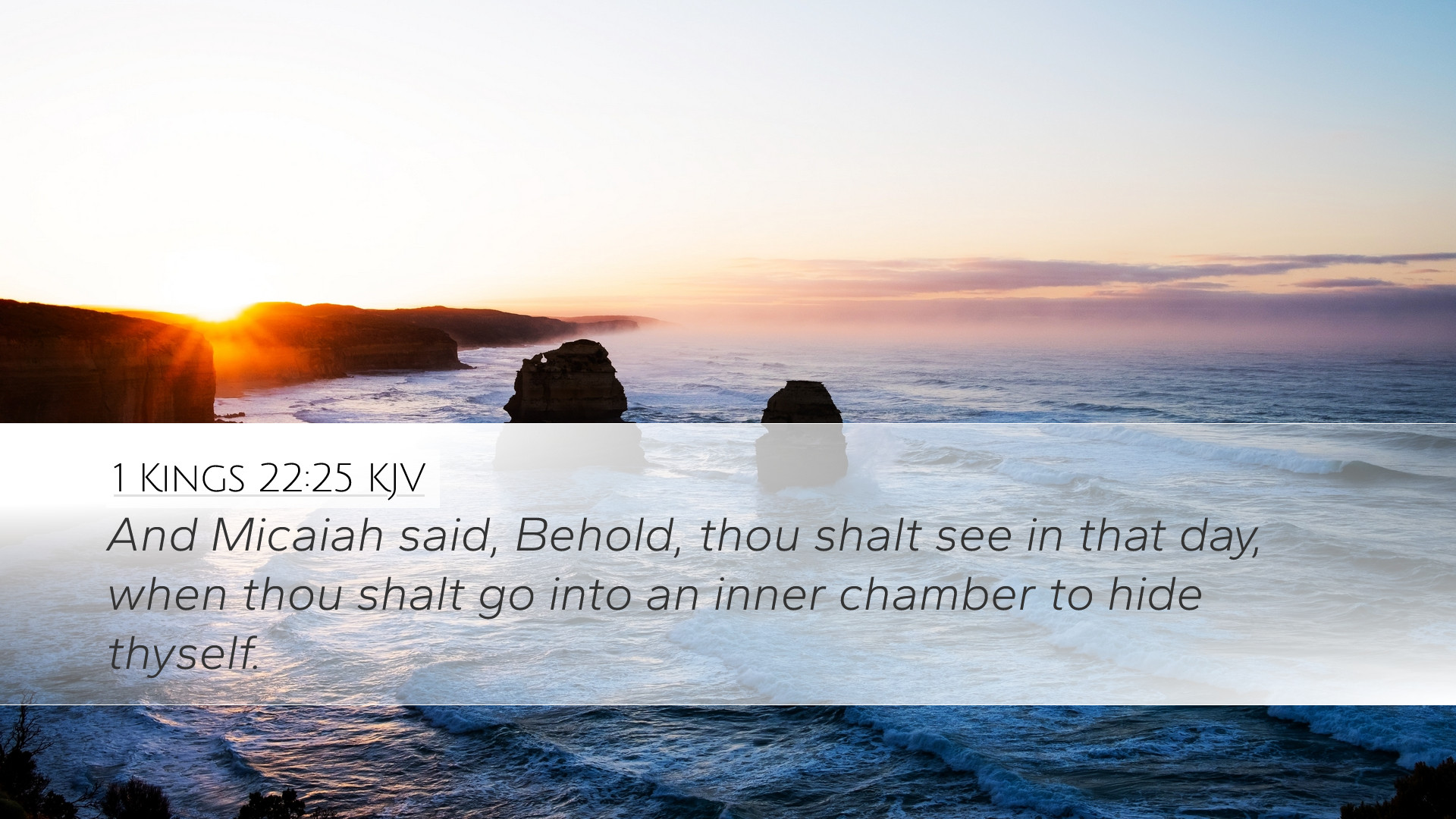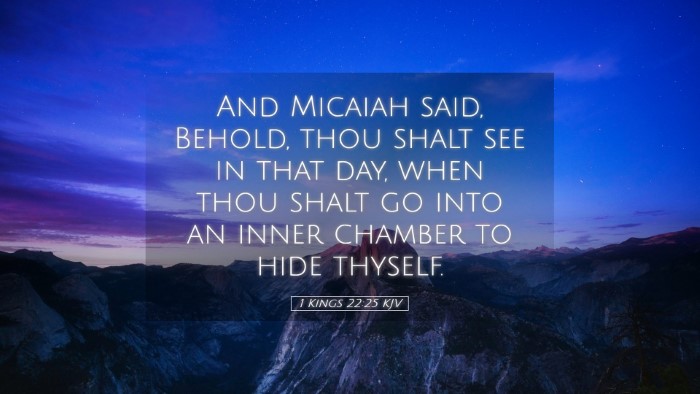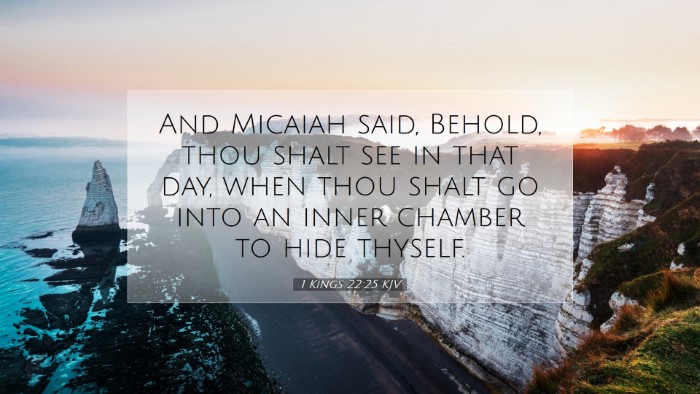Commentary on 1 Kings 22:25
1 Kings 22:25 states: "And Micaiah said, Behold, thou shalt see in that day when thou shalt go into an inner chamber to hide thyself." This verse, located within a narrative fraught with intrigue and prophetic insight, speaks volumes about the nature of truth, prophecy, and the impending judgment awaiting King Ahab of Israel.
Context of the Passage
This section takes place during a significant moment when King Ahab, motivated by his desire for conquest and validation of his plans, calls upon the prophets to seek counsel regarding an impending battle against Ramoth-gilead. Ahab's reliance on false prophets and his disdain for the genuine word of the true prophet, Micaiah, sets the stage for the dramatic confrontation that unfolds.
Insights from Public Domain Commentaries
Matthew Henry's Commentary
Henry points out that Ahab's request for prophetic guidance is laced with hypocrisy, as he only seeks validation for his own desires. Micaiah contrasts with the other prophets by delivering an unfiltered message from God, indicating the stark difference between true prophets and those who speak from their own hearts or societal pressures. Henry highlights:
- The Nature of Prophetic Truth: Micaiah's words reveal the consequences of defying divine truth and the inevitable outcome of Ahab's choices.
- The Irony of Ahab's Reactions: Ahab's dismissal of Micaiah's prophecy underscores the folly of ignoring God’s warnings and placing trust in deceitful counsel.
- The Call to Accountability: In stating that Ahab will hide in an inner chamber, Micaiah prophesies the futility of seeking refuge from God's judgment, a powerful reminder of accountability before the divine.
Albert Barnes' Notes
Barnes notes the traumatic irony of the hidden chambers, symbolizing the deceptive refuge that Ahab will seek in the face of divine retribution. Ahab's futile attempt to escape judgment illustrates a profound theological principle:
- The Omnipresence of God: No physical location can shield one from divine judgment or scrutiny. Ahab's inner chamber shadows the larger truth: God’s eyes are never far from His creation.
- Self-Deception: Ahab’s reliance on false prophets signifies the blindness that often accompanies unrepentant sin. The apostasy reflected in his choices serves as a warning against self-deception and reliance on convenience.
Adam Clarke's Commentary
Clarke emphasizes the dynamics of the prophetic confrontation and Micaiah’s unwavering stance in the face of threat and hostility. He argues that Micaiah represents the prophetic tradition’s essential commitment to truth, regardless of the consequences:
- The Role of the Prophet: Prophets, like Micaiah, are charged to speak the unvarnished truth, even in adversarial environments. Clarke asserts that true prophecy often incurs the wrath of those who prefer comfortable lies over hard truths.
- Tension Between Flesh and Spirit: Micaiah’s fearlessness is a testimony to the spiritual courage needed in ministry, encouraging pastors and leaders to uphold truth in challenging times.
Theological Reflections
This passage invites deep theological reflection regarding the nature of prophecy and the relationship between divine truth and human response. 1 Kings 22:25 serves as a critical reminder of the consequences of seeking validation from unreliable sources:
- Judgment & Accountability: The imagery of hiding speaks to the ultimate accountability every person has before God. There is no hiding from divine judgment when one resides in sin.
- The Urgency of Listening: A key takeaway for church leaders and theologians stresses the importance of discerning and authentic communication from God amidst numerous competing voices.
- The Consequences of Choices: Ahab's downfall is a cautionary tale of the devastating consequences of unwise choices made in disregard to God's will and warnings.
Application for Today
As contemporary readers engage with this verse, various applications arise for theological education and pastoral practice:
- Embrace Prophetic Voices: Encourage congregants and students to seek and embrace genuine counsel, especially in a culture saturated with misleading messages.
- Promote Accountability: Foster environments where accountability to God’s truth is paramount in church leadership and congregational life.
- Commit to Ethical Integrity: Uphold ethical integrity in decision-making and pastoral responsibilities, prioritizing alignment with divine truth over personal or institutional agendas.
Conclusion
1 Kings 22:25 is more than a historical account; it is a poignant reminder of the enduring battle between truth and falsehood, humble obedience, and self-serving agendas. The insights from Matthew Henry, Albert Barnes, and Adam Clarke collectively emphasize the critical nature of prophecy, the gravity of divine accountability, and the affirmation that no human effort can evade divine justice.


